
Eiyuden Chronicle: Hundred Heroes Review
Eiyuden Chronicle: Hundred Heroes did not have to exist. Nobody in a board room greenlit the game in order to fill a slot on a fiscal calendar. No established studio had the means or justification to persuade a publisher to fund it. Before Eiyuden's announcement in 2020, Konami had shown no interest (or possibly capability) in reviving the long-dormant Suikoden series. Hundred Heroes only manifested because veteran Suikoden creators from years past wanted to create this classically-styled RPG, and lapsed fans wanted to play it, leading to one of the most successful Kickstarter campaigns ever for a video game.
Let me state my biases here, first. It's essentially impossible to discuss Eiyuden Chronicle without mentioning its roots in Suikoden, and I have played every Suikoden title, save for the Japanese-only Tsumugareshi Hyakunen no Toki on PSP. I adore the series dearly, especially Suikoden II and Suikoden V, although I have soft spots for each entry, including Suikoden Tactics and Suikoden Tierkreis. So, the whole concept surrounding Eiyuden Chronicle: Hundred Heroes and its Kickstarter is more or less tailor-made for me and people like me. And thus, that's the perspective of this review.
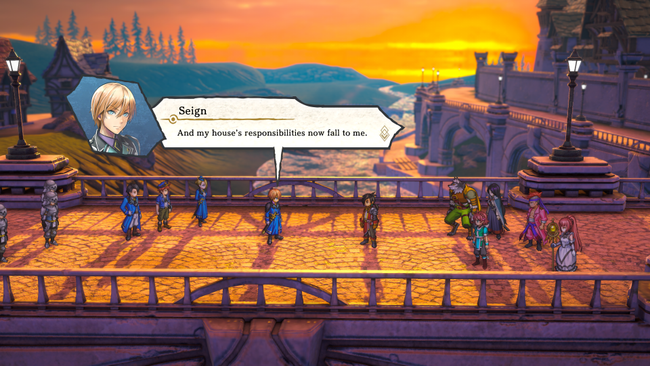
My primary concern for Eiyuden Chronicle, going into it, was that it might feel like a half-baked underwhelming rehash of Suikoden, while also possibly stretching out a modest development budget that wouldn't be able to achieve its ambition. Rabbit & Bear Studios was newly established to create this game, and thus had no pedigree to speak of as a developer. We've also all seen some Kickstarter projects stumble severely, despite achieving crowdfunding goals. Not only that, some of the early trailers for Eiyuden focused on a war-torn relationship between main characters Nowa and Seign, and I don't blame some people for asking themselves "Is this just Suikoden II again?".
Suikoden II is one of the most beloved RPGs on the original PlayStation, and I feared that Eiyuden might lean a little too far in that direction in its attempt to recapture that affection. But luckily, while there is a superficial resemblance, the narrative and character dynamics do swerve from those similarities relatively early on. Don't get me wrong, however. There are numerous places in which Eiyuden Chronicle is definitely Suikoden, especially in its combat stylings and other game mechanics.
Eiyuden is also much more fully-fledged than I was expecting. It's a lengthy adventure, with a full playthrough possibly reaching 50 hours if you go out of your way in recruiting characters, building your base, or messing around in the game's numerous minigames. This is a full-fat JRPG, one that feels like it time-shifted to the present from decades ago, at least in some ways, although there are some more modern elements of designs and convenience here.
The world of Eiyuden Chronicle is largely separated into two nations: the Galdean Empire and the loosely-unified League of Nations. At the onset of the game, Nowa joins a group of mercenary-slash-fixer-uppers as they embark on a cooperative mission between the League and Empire to investigate the location of a Primal Lens - a material possessing magnificent natural power. As you might imagine, though, tensions start to flare, ambitions manifest, and Nowa finds himself the head of a newly formed resistance alliance before too long.
Unlike many JRPGs that might focus on a core cast of 5-10 characters that stick together throughout the course of an adventure, a core component of Eiyuden Chronicle: Hundred Heroes (like Suikoden before it) is seeking out the numerous allies to either join your new alliance or to participate in battle. True to its subtitle, there are more than 100 characters that Nowa can recruit, and roughly 70 of these characters can be used in combat.
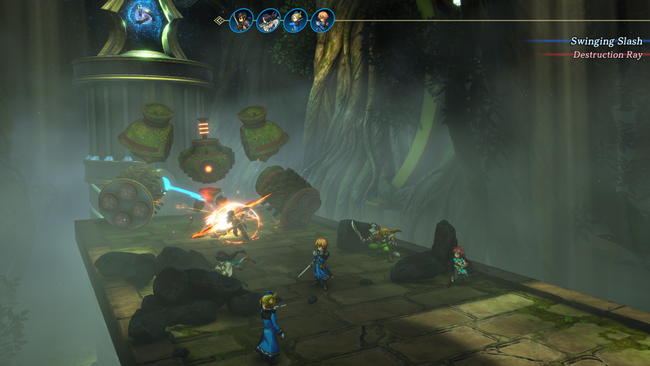
Those who have played Suikoden or Suikoden II will recognize the combat system. You dispatch a team of six fighters in two rows of three, and battles carry on in a round-based affair. With so many characters available to participate in battle, there is a variety of abilities and battle gimmicks available to build your combat team.
Thankfully, the game is designed in such a way that characters that are a much lower level than your foes will gain EXP at an exponentially higher rate, meaning it is practically painless to catch up any character to be capable in combat. The game encourages players to try out different character combinations, and considering the sheer number of characters available, switching out your combatants is something you'll likely be doing regularly.
There is also a Rune Lens system similar to Suikoden, which establishes the abilities and properties that each character exhibits. Some rune-lenses are inherent to a character. The swordswoman Mio, for example, has an ability Iaido Strike that deals Slash damage and has a chance of an instant kill. However, other Rune Lens slots can be unlocked and filled with various types of Lens, allowing for a little bit of flexibility in party creation and tinkering. I gave the martial artist Lian a Lens that increases her attack strength at the expense of her defense, making her a strong glass cannon attacker. You can also adjust the type of magic that mage characters can use, too.
For RPG players who like to coordinate battle parties, experiment with different battle rosters, and theorycraft different rune-character combinations, this may be where you enjoy the game most. However, Eiyuden Chronicle is not a challenging game, and on its normal difficulty level, it's actually fairly easy to become overpowered. There is a Hard Mode available, as well as various difficulty limiters such as double MP/SP cost or restrictions on item usage in battle, but these must be opt-into at the start of the game rather than something that can be toggled.
Going hand-in-hand with the character recruitment is the town-building aspect, which once again, Suikoden fans will already be familiar with. By recruiting new characters, you'll be able to unlock new functions at your self-named ever-growing town castle. As you progress through the game, you'll unlock new shops, new minigames, and new gameplay components. For example, some town upgrades will allow you to carry more items in your bag, or you can gain access to a sort of challenge trial room which you can use to power up your characters while gaining money and items. There's a material-collection component to building your town, but it's relatively basic in implementation.
There are also simulation-like war battles and one-on-one duels — both also regular constituents of Suikoden titles — but these are more like interactive scripted events than core gameplay components.
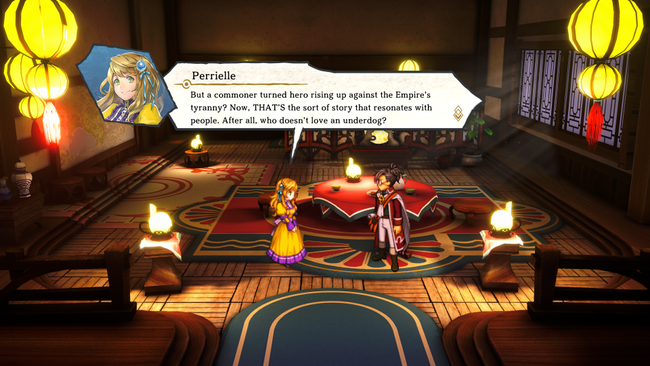
Eiyuden Chronicle is a game I enjoyed more the further I got into it. The opening hours are somewhat boilerplate and more slowly paced as world dynamics begin to be established and the character cast is introduced. Even major mechanical components of the game, such as the town-building function, take several hours to reach. Suikoden fans might be used to this, especially those who have played Suikoden III or Suikoden V. But once the world opens up a little, once you get access to fast-travel, and once the narrative starts to get rolling, I found myself more and more invested.
From a presentation standpoint, Eiyuden is everything I hoped it would be. Spritework has become more rare in the modern age, usually relegated to indie RPGs or Square Enix's HD-2D catalog. As much as I do appreciate the HD-2D style, I'm glad Eiyuden went for something that feels a bit more like classic Suikoden, with taller sprites and a larger variety of sprite styles.
The colorful sprites and animations are both excellent and nostalgic; I love seeing how Mio's hair cascades in the wind of battle as she grasps her katana from her scabbard. The ever-cool Yusuke — who never takes his hands out his pockets — stands in combat, chin up, with his headband and coat flowing behind him. Lian has a slight bounce to her battle-ready stance as if she's always ready to strike or dodge. The game uses a mix of 2D sprites in three-dimensional backgrounds, as well as some 3D boss encounters, and the mixture of styles is exceptionally well done. The world map is a bit more barren than towns or explorable areas, but that also makes the game feel more classic, in a way.
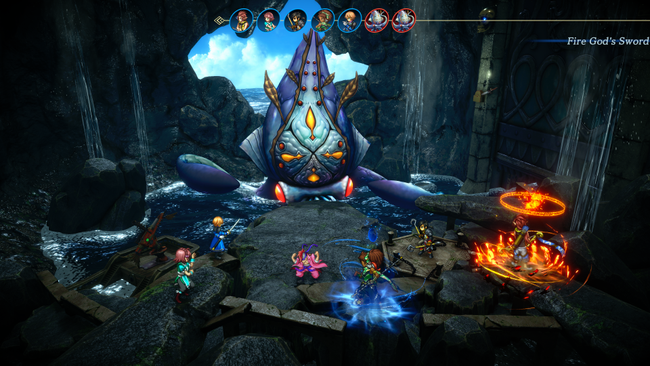
The musical score is excellent, too, primarily composed by JRPG stalwart composer Motoi Sakuraba, as well as contributions from Wild Arms veteran Michiko Naruke, Personally, Naruke's work on the Wild Arms series is some of my favorite in the genre, and being able to hear some of her music again after functionally a decade is heartwarming.
The voice acting is a bit of a mix, more good than bad (with Erin Yvette's portrayal as Perrielle a personal favorite), but with literally more than 100 voice characters, it was probably inevitable that there would be some real stinkers in there. That said, I was surprised at simply how much dialogue there is in the game, and almost all of it is voiced outside of some nameless NPC chatter. There are even numerous unique voice clips that take place in battle or various minigames like the town theater.
Much like how I felt with the companion game in Eiyuden Chronicle: Rising, Hundred Heroes' English text is also quite well done, with a handful of veteran RPG translators credited. I very rarely felt that a line came across as stilted or unnatural (which is something you cannot say about some Suikoden titles). This is another component I feared might end up lacking coming from a new studio and publisher that hasn't released many Japanese games, but I feel this is a strong showing in this regard.
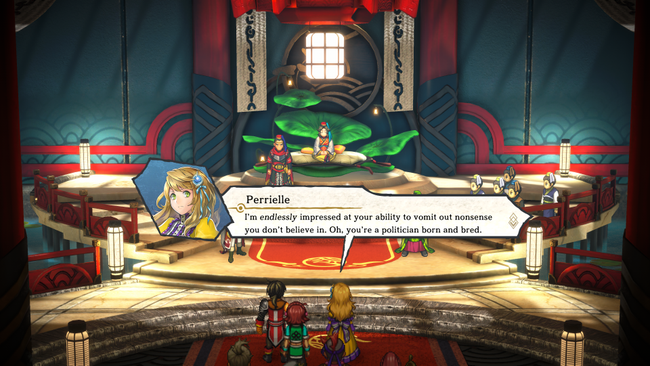
As far as writing and storytelling go, the one place I find Hundred Heroes somewhat lacking is in emotional impact. Suikoden has a handful of memorable, poignant scenes that come to mind throughout the series. 'Waiting for Jowy' in Suikoden II, Yun's sacrifice in Suikoden III, the duel with Miakis in Suikoden V; these moments and so many others have stuck with me for years. There were certain portrayals of personal character relationships that carried those stories, where I felt that much of Eiyuden's narrative is a bit more plain in comparison, despite good dialogue and believable writing otherwise. A good percentage of Eiyuden's narrative itself are fundamentally diversions from the plot (although Suikoden does this at times), usually with Nowa seeking out allies to join his growing army. I don't want to overstate a sense of dissatisfaction - it's charming and likeable, still, but I can't be certain what story moments might stick with me down the road.
I certainly have a litany of other small complaints. I wish the default run speed was faster than it is, not requiring an in-game item to achieve an adequate movement pace. I wish the English voice-acting was a little better overall. I wish the auto-mode in battle was a little faster. I wish Hard Mode was something I could toggle at will rather than have to opt-into permanently. I wish the menu navigation was a little bit snappier. I think some of the mini-game unlocks are a little overdone, especially considering how basic the minigames themselves tend to be. There's generally a Kickstarter shackling around the game where several components of the game are haphazardly included simply because they were promised in the initial crowdfunding. The pre-release build I played was also a bit buggy in places. But these are minor blemishes more than major flaws in design.
I cannot overstate how glad I am that Eiyuden Chronicle exists, and I adore its excellent presentation & nostalgic charm. Not everything landed for me as well as I hoped it would, but there's room to grow, and I truly hope Rabbit & Bear Studios gets the opportunity to continue with these characters in this world.